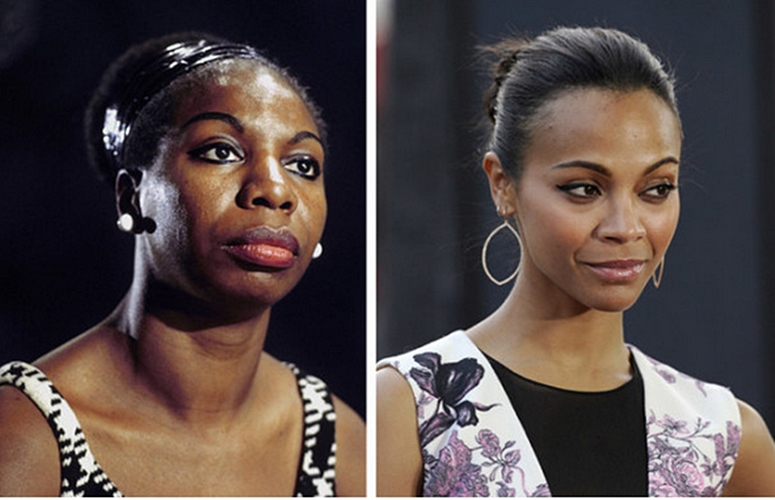The controversy over the upcoming Nina Simone biopic “Nina” just got even hotter. Jeff Lieberman, the director of the documentary “The Amazing Nina Simone” released in October 2015, is slamming the forthcoming biopic, calling it “ugly and inaccurate” after reading the feature’s screenplay before its premiere.
The film is to be released by RLJ Entertainment, it’s founder Robert L. Johnson, who’s a black man, defended the film to The Hollywood Reporter THR, saying, “That’s where some of this comes from, when you hear people saying that a light-skinned woman can’t play a dark-skinned woman when they’re both clearly of African descent,” he says. “To say that if I’m gonna cast a movie, I’ve gotta hold a brown paper bag up to the actresses and say, ‘Oh sorry, you can’t play her.’ Who’s to decide when you’re black enough?”
Lieberman slammed Johnson’s statements in a lengthy essay, disagreeing with not only the colorism comments but also about the inaccuracies about the events to be portrayed about Simone’s life. Lieberman writes:
“Robert Johnson’s defense of his film Nina was not only insulting, it was 100% wrong. As someone who has intensely studied Nina Simone for the past five years and recently released a documentary about her life and legacy based on interviews with over 50 of her friends, band members, family, lovers and fellow activists, I am saddened by the ugly and inaccurate portrayal contained in the script and trailer of Nina and by Mr. Johnson’s desperate attempt to defend the project,” Lieberman stated. “Let’s be clear: An actor is supposed to disappear in a role so the audience is only focused on the subject. The creators of Nina had the option to say, ‘Zoe Saldana is the best actor for the role and we believe in color-blind casting, and even though Nina Simone fought her whole life against being ‘too black,’ we still feel Ms. Saldana will embody Nina Simone beyond the physical.’ They did not do that. Recognizing and admitting themselves that she did not look the part and was not going to disappear into the role, they dressed her up (poorly) in blackface makeup and prosthetics, ignoring the horrible history of this type of portrayal.”
Lieberman continued, “For Mr. Johnson to now claim that this is black people against black people is outrageous, and a desperate distraction. People of all colors are angered because Hollywood has a long history of casting lighter-skinned actors, and even today with a black president in the Oval Office, the Oscars overlooking black actors, and the Black Lives Matter movement at its tipping point, dark-skinned people are still passed over, even for the role of a woman whose story is defined by her proud blackness. ‘To Be Young, Gifted and Black,’ ‘Black is the Color of My True Love’s Hair’ and ‘Four Women’ are all songs that Nina Simone proudly stood for. As Ta-Nehisi Coates said in his recent essay in The Atlantic, “A young Nina Simone would have a hard time being cast in her own biopic,'” he continued.
Lieberman continues to blast the film’s plotline, saying it has historical inaccuracies and his disdain about the focus being on her lowest points instead of her illustrious career. “The 1970s and 1980s were sadder times for Ms. Simone, and the 1990s perhaps the bleakest,” Lieberman wrote. “I had the opportunity to read the script for Nina four years ago, and it chose to focus on the 1990s…. The trailer for Nina reveals Ms. Saldana as Nina brandishing a gun, being strapped down in a hospital and throwing champagne bottles. Where there wasn’t truth, they invented it — turning Ms. Simone’s assistant, Clifton Henderson (played by David Oyelowo), into a love interest, despite the fact that he was an out gay man.”
“Nina” is slated to be released on April 22. Read the rest of Lieberman’s essay HERE.
Do you agree with Lieberman, Roomies?







